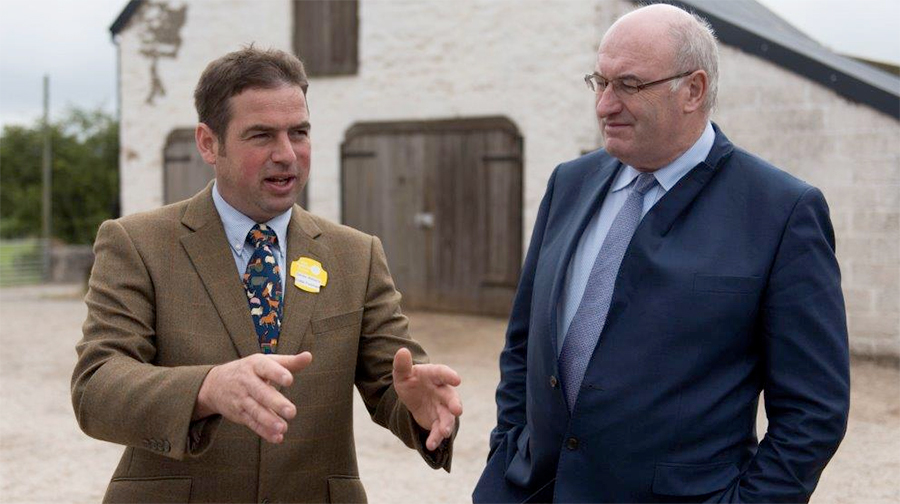
Many concerns about the challenges facing agriculture including low farmgate prices and CAP bureaucracy were raised to EU agriculture commissioner Phil Hogan as he visited a farm near Brecon.
The visit, hosted by Darren and Rachel Williams, tenant farmers at Talwen Fawr, was the second meeting between the FUW and the commissioner during his two day visit.
Speaking after the visit, Mr Williams, who is chairman of the FUW’s younger voice for farming committee as well as vice chairman of the FUW’s Brecon and Radnor county branch, said: “As a farming family with two young children on a 100 hectare tenanted farm, it was a great opportunity to meet the commissioner and highlight numerous concerns and challenges we face.”
Among the many issues raised with the commissioner were the current low farmgate prices for lamb and milk, the need to simplify the new CAP to reduce bureaucracy and unfair penalties, and the long term future of the CAP.
“We are currently receiving £25 to £30 less for our lambs than we were last year and facing further severe cuts to payments, while the costs of bureaucracy and risks of unfair penalties are escalating.”
Mr Williams said, moves already instigated by the commissioner, which will reduce the burden of the new CAP regulations were welcome, but a great deal remained to be done to fulfil the EU’s stated objective of reducing bureaucracy.
“We therefore welcomed commissioner Hogan’s commitment to continue to review areas of the regulations where changes can be made, and to make changes as soon as possible.
“We try wherever possible to use technology to help the business become more efficient, with all our animal records kept on computer using cloud technology and mobile apps, and GPS installed on the tractor.
“However, when the regulations with technology such as sheep EID require 100 percent accuracy and the system has an inherent fail rate of around 5 percent we still need tolerances.
“Having time to allow the older generation to adapt and recognition of poor mobile phone and broadband availability is therefore essential.”
Mr Williams also highlighted the extreme complexity of the new Basic Payment Scheme rules, and showed the commissioner a first-hand an example of an area of grazed woodland which was excluded under the new scheme.
Williams also said the UK had suffered severely as a result of the Commission's decision to exclude grass growing trees spaced at 10 metres or less from Basic Payment Scheme eligibility.
“This is clearly nonsensical from an environmental point of view as well as being detrimental to farms where areas of woodland provide important shelter and grazing for animals.”
The commissioner heard how, despite a commitment by the previous administration to reduce bureaucracy, the reality was that Welsh government and farmers had been burdened with far more costs and red tape at a time when budgets were severely reduced.
“Yet, against this background, small errors and subjective interpretations of measurements can bring harsh penalties,” added Mr Williams.
Mr Williams further said it was essential to start discussions on the next CAP as soon as possible.
“Given the problems and delays in reaching agreement over the previous CAP there is a compelling argument in favour of having a rolling review aimed at simplifying the current rules, while also starting to discuss and plan what the next CAP should look like as soon as possible.
“We need a scheme that recognises the importance of food production, encourages active and productive farmers and ensures succession within the industry,” he added.
